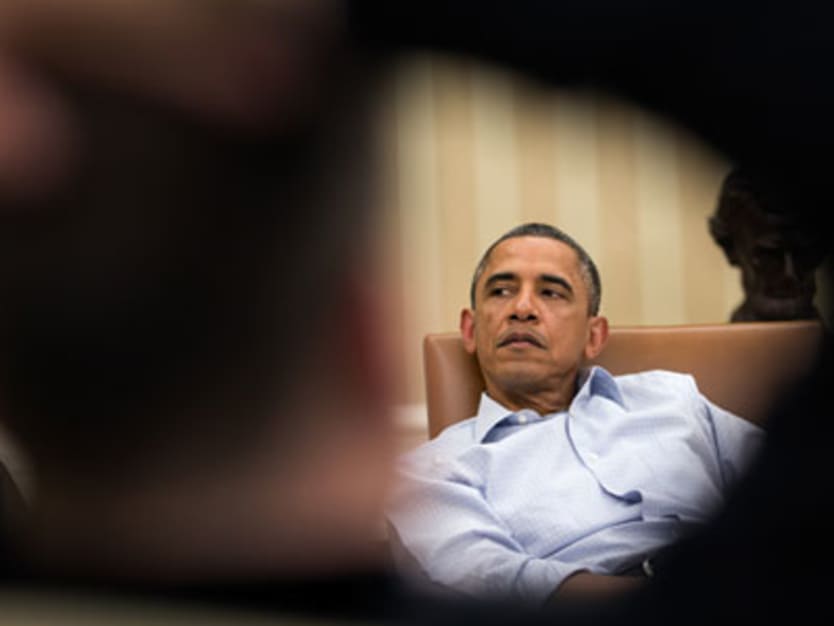
All eyes are on Washington today as the White House releases its budget request for fiscal 2014. Initial responses from the global development community have been positive.
Oxfam America said: “The President’s budget proposed level funding for key anti-poverty programs, such as Feed the Future, the Millennium Challenge Corporation, while pushing forward reforms of America’s food aid programs that would help feed possibly millions more people with no additional costs to the American taxpayer.”
Here are five things to watch out for:
Food aid
The Obama administration is continuing to push for food aid reform, seeking more flexibility to purchase food from local or regional sources instead of shipping abroad surplus crops bought from U.S. farmers.
Rumors about such plans set up a flurry of activity on Capitol Hill in the past few days. U.S. agribusinesses, shipping companies and farm-state lawmakers are keen to see the United States continue to buy surplus crops domestically to help starving people abroad. Organizations like Oxfam, meanwhile, have been arguing for years that this practice wastes money and disrupts regional markets in the developing world.
The White House is now requesting $1.8 billion for the U.S. Agency for International Development’s food assistance programs, proposing to shift $1.1 billion to international disaster assistance for emergency food response ($1.4 billion total) and $250 million to development assistance for the Community Development and Resilience Fund to address chronic food insecurity in areas of recurrent crises ($330 million total). It also wants to create an Emergency Food Assistance Contingency Fund worth $75 million.
Under the proposal, at least 55 percent of the requested $1.4 billion in total funding for emergency food assistance would go toward the purchase, transport and related costs of U.S. commodities.
Many past efforts to overhaul U.S. food aid have failed amid intense lobbying from the powerful agricultural lobby. Industry pressure will be similarly high this time around.
Global health
Last year, President Barack Obama’s proposed cuts to humanitarian assistance and global health — including a $542.9 million reduction from the U.S. President’s Emergency Plan for AIDS Relief — prompted concerns from health advocates and nongovernmental organizations.
InterAction, the U.S. alliance of global development NGOs, wrote this week: “If the United States does not follow through on global health commitments, there could be a reversal or stagnation of recent gains in reducing maternal deaths and incidences of tuberculosis, malaria, HIV and other diseases in developing countries.”
An initial review of the White House proposal suggests that advocates need not worry.
Immediately before its officially released, U2 frontman and ONE Campaign co-founder Bono said about the $1.65 billion budget request for the Global Fund to Fight AIDS, Tuberculosis and Malaria: “President Obama’s budget puts the world on a winning path to finally beat AIDS, TB and malaria. These killer diseases aren’t quite on the ropes but they are teetering; now, thanks to this budget, we’re closer than ever to delivering the knockout punch. All of us at the ONE Campaign are grateful for the President’s commitment, and to the ongoing commitment from Republican and Democratic leaders to support these life-saving programs.”
There’ll be cuts this year in some areas of global health, as well as muted criticism by implementing partners. The Obama administration will argue that the cuts are mainly because it is being successful and meeting its targets.
Sequestration
As a result of dreaded government-wide cuts, which took effect March 1, the foreign aid budget is being slashed 5 percent. How exactly has been unclear so far. In its 2014 budget request, the White House proposes to replace some of the sequester cuts with alternative ways to trim the U.S. budget deficit.
Watch out for a reduction in country programs and operating expenses especially for USAID, as well as any mention of procurement reform and other aspects of USAID Forward, especially the administration’s goal to partner more with institutions in the developing world by increasing the share of local procurement to 30 percent — a plan that U.S. contractors have criticized.
Multilaterals
The Obama administration has been eager to beef up triangular collaborations and work more through multilateral fora like the World Bank. Some Republicans, meanwhile, have been trying to compel U.N. reforms by threatening cuts in U.S. contributions.
But not surprisingly, the 2014 budget request is multilateral-friendly.
“The president’s budget rightly honors our commitments to the U.N. and calls for paying our dues,” Peter Yeo, executive director of the Better World Campaign, said in a statement today. “It comes at a particularly critical time as the U.S. confronts global threats in Syria, North Korea and Iran.The U.S. cannot and should not have to go it alone in such trying times, and our strong engagement at the UN ensures that we do not have to.”
Yeo continued: “With respect to peacekeeping dues, some shortfalls from last year still remain, as does the arbitrary legal cap on peacekeeping contributions. The U.S. has advocated and voted for each of the 14 peacekeeping missions currently deployed, because these missions are manifestly in our national interest. In addition, other countries put their troops’ lives on the line, including five Indian peacekeepers who tragically died this week while carrying out their service in South Sudan. We should honor their commitment to peace and security and fully fund our peacekeeping obligations. We look forward to working with Congress and the Administration to ensure full funding to UN peacekeeping and to other vital U.N. accounts.”
Neither party may want to pick a fight this time around. One thing is clear: U.S. contributions to the Global Fund and other multilateral institutions will be closely watched since they have model character for other donors as well.
Fragile and post-conflict states
Last year, some pundits questioned the inclusion of Egypt in the 2013 budget request despite strained relations with the United States. Expect similar questions this year — not just on Egypt, but also on Afghanistan and Pakistan as well as fledgling democracies like Libya, Somalia and South Sudan.
Also, will the United States deliver aid to Syria — and if so, how? Will aid to the Palestinian territories be based on conditions?
Stay tuned for our detailed review of the Obama administration’s fiscal 2014 budget request.
Read more on U.S. aid reform online, and subscribe to The Development Newswire to receive top international development headlines from the world’s leading donors, news sources and opinion leaders – emailed to you FREE every business day.








